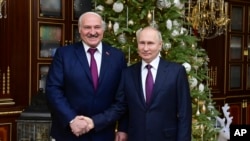The two allies will conduct air force drills from Jan. 16-Feb. 1 using all Belarus military airfields and began joint army exercises involving a "mechanized brigade subdivision" on Monday, the Belarusian defense ministry said.
Minsk says the air drills are defensive and it will not enter the war against Ukraine launched by Russia on February 24, 2022.
"We're maintaining restraint and patience, keeping our gunpowder dry," said Pavel Muraveyko, first deputy state secretary of Belarusian Security Council, according to a post on the Belarusian defense ministry's Telegram app on Sunday.
Muraveyko said the situation on the country's southern border with Ukraine was "not very calm" and that Ukraine has been "provoking" Belarus.
Russia used its neighbor Belarus as a springboard for its invasion of Ukraine last February.
"We are ready for any provocative actions on the part of Ukraine," he said.
Moscow denies that it has been pressuring Belarusian President Alexander Lukashenko to take a more active role in the conflict in Ukraine.
Ukraine has continuously warned of possible attacks from Belarus and President Volodymyr Zelenskiy said last week that the country must be ready at its border with Belarus.
Belarus has conducted numerous military exercises since the invasion began, both on its own and jointly with Russia. Together with Moscow, Minsk has also been bolstering the drills with weaponry and military equipment.
Meanwhile, Ukraine saw little hope of pulling any more survivors from the rubble of an apartment block in the city of Dnipro on Sunday, a day after the building was hit during a major Russian missile attack, with dozens of people expected to have died.
Valentyn Reznichenko, governor of the Dnipropetrovsk region, said on Monday that 35 people were confirmed dead so far and the fate of 35 more residents remained unknown.
Ukraine's Air Force said the apartment block was struck by a Russian Kh-22 missile, which is known to be inaccurate and that Ukraine lacks the air defenses to shoot down. The Soviet-era missile was developed during the Cold War to destroy warships.
Moscow has been pounding Ukraine's energy infrastructure with missiles and drones since October, causing sweeping blackouts and disruptions to central heating and running water.
In his nightly address after the Dnipro strike, Zelenskiyy called on Western allies to supply more weapons to end "Russian terror" and attacks on civilian targets.
On Saturday, Britain followed France and Poland with promises of further weapons, saying it would send 14 of its Challenger 2 main battle tanks as well as other advanced artillery support in the coming weeks.
The first dispatch of Western-made tanks to Ukraine is likely to be viewed by Moscow as escalation of the conflict. The Russian Embassy in London said the tanks would drag out the confrontation.
